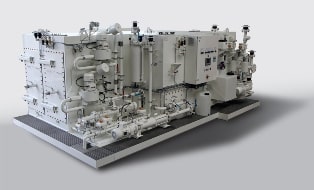ACO Marine has received Transport Canada type-approval for its advanced Maripur NF and Clarimar MF wastewater management systems.
“We are delighted to have received approval from Transport Canada. Certification delivers added assurance to Canadian shipowners that our technology is completely compliant with Canada’s stringent sewage discharge requirements for vessels operating in the Great Lakes,” said Mark Beavis, Managing Director, ACO Marine.
He added: “Transport Canada certification, issued in December, underpins our strategic decision to grow our Canadian customer base, following the recent appointment of Ontario-based Marine and Offshore (MAO) as our new distributor for the region. MAO has always had a very concise and professional approach to meeting Transport Canada requirements and now ACO Marine’s suite of environmentally safe and cost effective solutions can benefit vessels with operations in this ecologically sensitive marine environment.”
While Canada has not acceded to MARPOL Annex IV, it has adopted its own more stringent rules in Division 4 of its Regulation for the Prevention of Pollution from Ships and for Dangerous Chemicals. The Regulation is based on the international requirement and replaces the previous Great Lakes Sewage Pollution Prevention regulation.
With some exceptions, the rules ban the discharge of untreated sewage within 3 nautical miles of land from ships less than 400t and 12 nautical miles from those larger than 400t. Treated sewage is only allowed to be discharged into Canadian waters subject to specified limits of faecal coliforms per 100 ml of water.
Both Clarimar MF and Maripur NF units exceed the discharge standards set out in MEPC 227(64), with the Maripur NF additionally meeting the Section 4.2 clause requiring vessels with more than 12 passengers operating in designated “special areas” to reduce the phosphorous and nitrogen content of treated effluent.
Type-approval testing has verified that the systems can reduce Coliform Bacteria to 17.5 count/100ml [standard is 100 count/100ml], TSS to 2.4mg/l [standard is 35mg/l], BOD to 7.3mg/l [standard is 25mg/l], and COD to 60mg/l [standard is 125mg/l], while nitrogen and phosphorous content is significantly below the mandated levels of 20mg/l and 1mg/l at 7.2mg/l and 0.3mg/l respectively.

